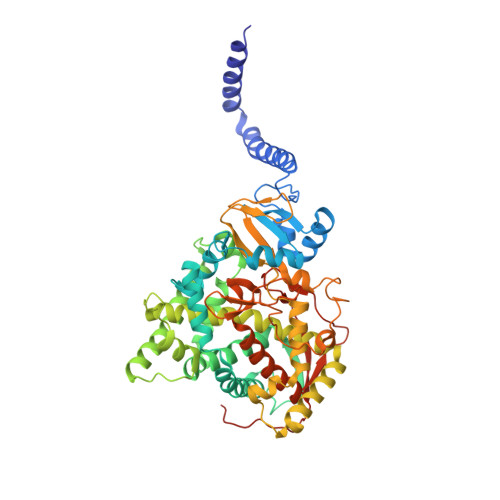Impact of Homologous Resistance Mutations from Pathogenic Yeast on Saccharomyces cerevisiae Lanosterol 14 alpha-Demethylase.
Sagatova, A.A., Keniya, M.V., Tyndall, J.D.A., Monk, B.C.(2018) Antimicrob Agents Chemother 62
- PubMed: 29263059
- DOI: https://doi.org/10.1128/AAC.02242-17
- Primary Citation of Related Structures:
5ESE, 5ESF, 5ESG, 5ESH, 5ESI, 5ESJ, 5ESK - PubMed Abstract:
Fungal infections frequently affect immunodeficient individuals and are estimated to kill 1.35 million people per annum. Azole antifungals target the membrane-bound cytochrome P450 monooxygenase lanosterol 14α-demethylase (CYP51; Erg11p). Mutations in CYP51 can render the widely used triazole drugs less effective. The Candida albicans CYP51 mutation G464S and the double mutation Y132F G464S (Y140F and G464S by Saccharomyces cerevisiae numbering) as well as the CYP51A G54E/R/W mutations of Aspergillus fumigatus (G73E/R/W by S. cerevisiae numbering) have been reproduced in a recombinant C-terminal hexahistidine-tagged version of S. cerevisiae CYP51 (ScErg11p6×His). Phenotypes and X-ray crystal structures were determined for the mutant enzymes. Liquid microdilution assays showed that the G464S mutation in ScErg11p6×His conferred no difference in the susceptibility of yeast to triazole drugs but in combination with the Y140F mutation gave a 4-fold reduction in susceptibility to the short-tailed triazole fluconazole. The ScErg11p6×His Y140F G464S mutant was unstable during purification and was not crystallized. The ScErg11p6×His G73E/R/W mutations conferred increased susceptibly to all triazoles tested in liquid microdilution assays. High-resolution X-ray crystal structures reveal two different conformations of the ligand itraconazole, including a previously unseen conformation, as well as interactions between the tail of this triazole and the E/W73 residue. This study shows that S. cerevisiae CYP51 adequately represents some but not all mutations in CYP51s of pathogenic fungi. Insight into the molecular mechanisms of resistance mutations in CYP51 will assist the development of inhibitors that will overcome antifungal resistance.
Organizational Affiliation:
Sir John Walsh Research Institute, University of Otago, Dunedin, New Zealand alia.sagatova@otago.ac.nz.















